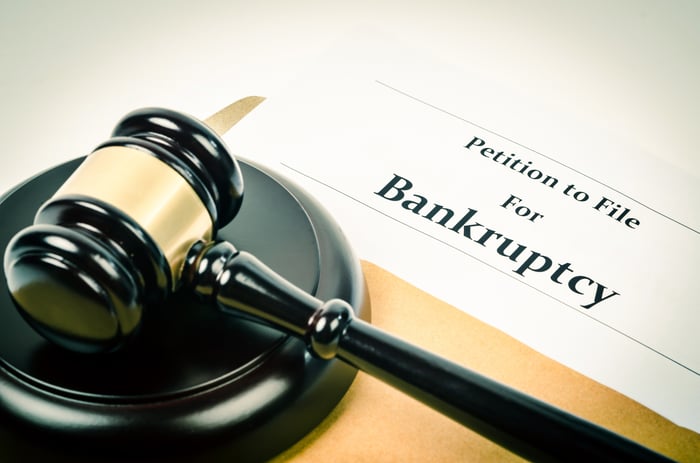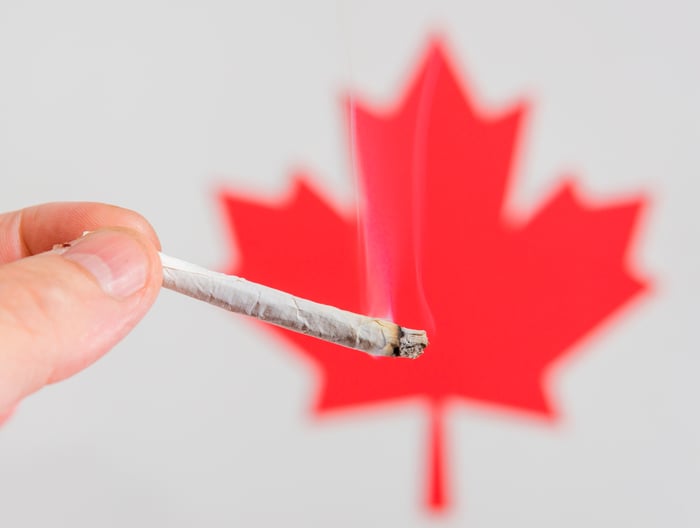A wild year of volatility for equities has brought investors of all sorts out of the woodwork. Although the ferocity of the first-quarter decline was a bit unnerving for all, it provided one heck of an opportunity for long-term investors to put their money to work in high-quality businesses.
The same can't be said for short-term traders, or those chasing whatever happens to be this week's or month's hot stock on Wall Street. A quick glance at the investment activity by members of online investing app Robinhood confirms that some awful companies are being purchased.
Robinhood has been particularly successful at courting young and/or novice investors; the average age of its members is 31. Don't get me wrong -- it's fantastic to see young people starting early and putting their money to work in the stock market. However, Robinhood is failing to provide the tools or education necessary for these newbies to succeed. As a result, the company's leaderboard (i.e., the 100 most-held stocks on the platform) is a mishmash of bad businesses.
Three of these top Robinhood stocks may go bankrupt within the next couple of years.

Image source: Getty Images.
Nikola
As of today, fuel cell electric vehicle (EV) manufacturer Nikola (NKLA 1.36%) has an abundance of cash. It ended its first quarter as a public company (following its reverse merger) with $698.4 million in cash and cash equivalents, and appears to be closing in on a $2 billion equity investment from industry titan General Motors (GM 5.17%) as of Tuesday, Sept. 29. This deal would undoubtedly give Nikola plenty of financial flexibility to execute its vision of mass-producing the Badger EV fuel cell truck by as soon as next year.
But just because Nikola has plenty of cash now doesn't mean the company's vision will translate to success. Nikola has been the target of a short-side report from Hindenburg Research, which laid out multiple allegations of fraud against the company and its founder, Trevor Milton. The Securities and Exchange Commission has since opened a probe into Hindenburg's allegations.
Though investors have learned to take these short-side reports with a grain of salt (the firms issuing these reports often have vested short interests in the companies they accuse of fraud), there's a lot that simply doesn't add up with Nikola. Founder Trevor Milton recently exited his role as Executive Chairman of the board via a middle-of-the-night tweet, and he's since been accused of sexual abuse in two separate instances.
What's more, Nikola intends to lean on General Motors to provide the battery and fuel cell technology that'll be used in manufacturing the Badger. If Nikola's technology is as impressive as the company has implied, it's a bit odd that General Motors will be tasked with providing the battery supply.
Investors should expect growing pains from Nikola -- which, in my view, may not survive over the long run if the serious dark clouds overhanging the company linger.

Image source: Getty Images.
Tilray
Brendan Kennedy, the CEO of Canadian licensed cannabis producer Tilray (TLRY), suggested in an interview earlier this year with BNN Bloomberg that he wouldn't be surprised if another dozen cannabis stocks went bankrupt as funding for the industry dries up. Unfortunately, I believe that his company might be one that fails to survive over the long run.
In theory, Canada was supposed to be the blueprint of success for the rest of the world. It became the first industrialized country to greenlight recreational marijuana in the modern era, and licensed producers like Tilray were expected to be clear and obvious winners. But nothing of the sort has happened. Instead, regulatory-based supply constraints have crushed any hope of a substantive increase in operating margins.
Perhaps the most damning aspect of the Canadian adult-use market is that licensed producers have had no choice but to introduce value brands to go head-to-head with cheaper black-market marijuana. As a result, the average selling price per gram of cannabis for Tilray and its peers has fallen like a rock. This is sapping any opportunity these Canadian marijuana stocks had to push into the green.
Another issue for Tilray is that its pricey acquisition of Manitoba Harvest hasn't quite yielded the expected benefits. Manitoba Harvest is a hemp foods company that Tilray purchased to access to the company's lucrative retail distribution network. The plan was to distribute cannabidiol (CBD) products throughout North America. However, CBD sales growth slowed to a crawl in the U.S. following the Food and Drug Administration's decision late last year to not approve CBD as a food or beverage additive.
With more than $435 million in outstanding convertible notes and Tilray still losing money hand over fist, its survival is not guaranteed.

Image source: American Airlines.
American Airlines Group
Finally, despite being one of the top-10 most-held stocks on the entire platform, American Airlines Group (AAL -1.07%) probably won't survive without seeking a reorganization through bankruptcy protection.
If there's a bright side for American Airlines, it's that the company has been able to access capital during the steepest economic downturn in decades. The company was able to raise billions through convertible debt offerings and newly issued stock. American Airlines also qualified for a coronavirus disease 2019 (COVID-19) relief loan of $5.5 billion -- but that's where the good news stops.
Fundamentally speaking, the airline industry looks like damaged goods. It's impossible to tell when passengers are going to feel comfortable taking to the skies again. That's a big problem for a company that's piled on debt like no other airline stock, and that operates in a capital-intensive but low-margin industry.
As my airline-focused Foolish colleague Adam Levine-Weinberg pointed out in 2018, American Airlines retired commercial planes well before their usage period was up. By updating its fleet, the company buried itself in debt that minimized its financial flexibility before COVID-19 hit.
As of the most recent quarter, American Airlines had $9.8 billion in cash and cash equivalents, but was sitting on $40.1 billion in total debt. Even after suspending share buybacks and dividend payments, the company's future isn't guaranteed. It'll be crushed by higher interest payment for years to come, and it's forecast to lose $1.4 billion in 2021, according to Wall Street's current consensus.
Put simply, the airline industry isn't built to withstand more than a light economic hiccup. The stiff breeze created by COVID-19 could be enough to topple American Airlines.





